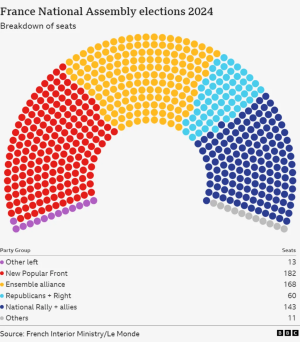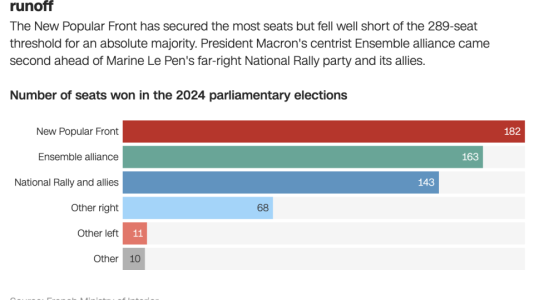- Joined
- Sep 11, 2023
- Runs
- 25,740
French elections: How do they work and why are they so significant?
Emmanuel Macron's decision to call two rounds of elections on 30 June and 7 July is seen by rivals and allies as a reckless gamble that is about to hand political power to the far right.
His aim was to regain control of French politics, but that’s not what the opinion polls say will happen.
Why is France holding elections?
Mr Macron had no need to call National Assembly elections for another three years.
But an hour after his Renew alliance was trounced in European elections by the far-right National Rally party of Jordan Bardella and Marine Le Pen on 9 June, the French president went on TV to say he couldn’t act as if nothing had happened.
His party came third and he said it was time for France’s people and politicians “who do not recognise themselves in the extremist fever” to build a new coalition. It was, he said later, the "most responsible solution".
What was Macron thinking?
Apparently Mr Macron had been thinking about calling an election for months, but it came out of the blue even for his closest colleagues.
France is on the cusp of a massive event, with the Paris Olympics running from 26 July to 11 August. It has now had a lightning-fast election campaign as well.
Mr Macron clearly wanted to break a logjam, after his failure to secure an absolute majority in the National Assembly in June 2022. Passing laws has become a real headache - he had to force through pension reforms without a vote while tougher immigration rules required National Rally support.
“France needs a clear majority if it is to act in serenity and harmony,” Mr Macron argues. And yet he has left French politics and his own party in turmoil.
His centrist Ensemble alliance of Renaissance, Horizons and MoDem is languishing in the polls, behind a swiftly formed left-wing New Popular Front, made up of Socialists, Greens, Communists and the far-left France Unbowed (LFI).
"He killed off the presidential majority," said Horizons leader and ex-Prime Minister Edouard Philippe.
“This decision has created everywhere in our country, in the French people, worry, incomprehension, sometimes anger," says Finance Minister Bruno Le Maire.
Why are these elections so significant?
For the first time in France, National Rally could win power, despite widespread appeals to voters to steer clear of extremes.
RN is led by 28-year-old Jordan Bardella and in parliament by Marine Le Pen, who has fought for the presidency three times and lost each time.
But each time she won more votes. Now the polls says her party could become the biggest in France, falling short of an absolute majority.
Ms Le Pen also has an eye on the next presidential election in three years' time.
How do French elections work?
There are 577 seats in the National Assembly, including 13 overseas districts and 11 constituencies that represent French citizens abroad. For an absolute majority a party needs 289.
The Macron alliance had only 250 seats in the outgoing Assembly and had to build support from other parties every time to pass a law.
The first round eliminates all candidates who fail to win the support of 12.5% of locally registered voters.
Anyone who scores more than 50% of the vote with a turnout of at least a quarter of the local electorate wins automatically.
That normally happens only in a handful of constituencies, but the RN believes this time it could win dozens.
The second round is a series of run-offs fought either by two, three or sometimes four candidates.
Because turnout is expected to be high, Ipsos pollster Brice Teinturier estimates at least 250 seats could become three-way races next Sunday.
Some candidates may drop out before 7 July to give an ally a better chance of stopping a rival from winning, for example from the far right.
The two-round system means nothing is certain, but political expert Jérôme Jaffré says there is a real risk for the Macron camp that many of their MPs will either not qualify at all for the run-offs or scraping through in third place.
RN have 88 seats in the outgoing parliament, but polls suggest they could win 220 to 260.
Until now voters have traditionally used “le vote utile” - tactical voting - to form a "barrage" and keep the far right out.
But that barrage is this time more likely to benefit the left than Mr Macron's Ensemble. And many voters in the centre might prefer RN over the Popular Front, because of the dominance of Jean-Luc Mélenchon's far-left France Unbowed.
What if Macron’s party loses?
Whoever wins, Mr Macron has said he will not resign as president.
If his party loses, and National Rally wins, then the question is whether RN can win an absolute majority of 289 seats, or a relative majority similar to that held since 2022 by the Macron camp.
An RN victory could open the door to almost three years of “cohabitation”, or power-sharing, when the president of one party heads the state and another party runs the government.
It’s happened before, with domestic policy in the hands of the prime minister and foreign and defence policy in the hands of the president.
Will Jordan Bardella be PM?
Not necessarily.
Under the constitution it is Mr Macron who decides who leads the next government. And Mr Bardella says he will not become prime minister if RN doesn’t secure that absolute majority: “I don’t want to be the president’s assistant.”
A relative majority, he said, would leave him unable to act: "I’m not going to sell the French people measures or actions that I couldn’t follow through.”
But Mr Macron does have to reflect the make-up of the new Assembly, so if National Rally are the predominant party he could find it hard to choose someone else.
Party campaign posters proclaim Mr Bardella as prime minister. He has a big presence on TikTok but his biggest job has been as a member of the European Parliament since 2019.
Has cohabitation happened in France before?
Not for more than 20 years, as parliamentary elections now come hard on the heels of presidential votes, and voting preferences do not change much within that time.
There have been three periods of cohabitation in the past:
1997-2002 Socialist Lionel Jospin was prime minister under centre-right President Jacques Chirac
1993-95 Centre-right Prime Minister Edouard Balladour worked with Socialist President François Mitterrand during his second term
1986-88 Jacques Chirac was prime minister under President François Mitterrand
But nothing has really prepared France for the kind of cohabitation that could occur after 7 July.
Is National Rally still far-right?
For years Marine Le Pen has sought to “de-diabolise” or detoxify her party from the antisemitic and extremist roots of her father, Jean-Marie Le Pen, and his fellow founders of the National Front, which she renamed as National Rally.
Much of its focus now is on the cost-of-living crisis, but many of its strict anti-immigration policies remain and a ruling this year by the Council of State, France's highest court for administration, confirmed it could be considered “extreme right”.
France football captain Kylian Mbappé has warned his compatriots “the extremes are at the gates of power”, prompting Mr Bardella to hit back at multimillionaire sports figures "giving lessons to people struggling to make ends meet".
Mr Bardella wants to ban French dual nationals from sensitive strategic posts, calling them "half-nationals". He also wants to limit social welfare for immigrants and get rid of the automatic right to French citizenship for children with foreign-born parents.
But a planned ban on wearing headscarves in public is for now not a priority.
Anti-Nato and anti-EU policies have also been softened and National Rally's close ties with Vladimir Putin's Russia have been quietly dropped.
Leaving the EU has not been on the agenda since 2022. Instead, Mr Bardella focuses on cutting VAT (sales tax) on energy and a list of 100 essential goods and repealing the Macron pension reforms in a matter of months.
What does the left promise?
The New Popular Front is an unlikely alliance of Socialists, Greens, Communists and France Unbowed.
They have promised to scrap the Macron pension and immigration reforms and their platform is otherwise based on the idea that “it’s either the far right, or us”.
President Macron has attacked the group as being “totally immigrationist” and allowing people to change gender at their town hall, an accusation that has prompted allegations of transphobia.
The Popular Front has promised to fight antisemitism, even though it includes candidates who have been accused of making antisemitic remarks.

French elections: How do they work and why are they so significant?
The far right could win parliamentary elections called by President Macron on 30 June and 7 July.

















